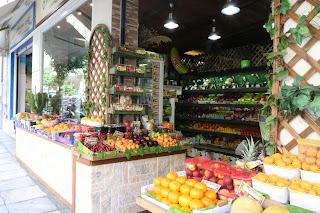Today we get to sleep in, as the bus doesn't leave for Athens until 9 AM.
Greece has the most official holidays of any country except Holland and most are religious ones., Emmie tells us about "Clean Monday" which is the first Monday of Lent. It is a time to sober up and start fasting for Lent. Fasting requires eating no animal products. They CAN eat shellfish and anything without blood. Dips made from caviar, split peas and eggplant are popular with unleavened bread. Sweets without milk or eggs, fruits, dark chocolate and more. This is also Kite Flying Day - either purchased or home made and there is kite fighting. When it gets dark they fly candle-powered luminaries (similar to Thailand) signifying prayers lifting to heaven.
In Greece, men and women follow mostly traditional roles, where women run the household and care for their children. Men have financial power and are rather macho, but women tend to make the important family decisions. It is considered a matriarchal society. Sparta was especially this way in history, as men were warriors and women did everything else. The men carried swords in their right hand and shield in the left - the shield was meant to protect the soldier to his left. Today more women are college-educated than men, so things are changing. We saw quite a few men pushing strollers in Iannioni. Men tend to take over the family farm or business.
Before the canal, I've been told, the sailers moved their ships across the land by rolling them on logs! The area was a real "sin city" kind of place in catering to the sailers, which is why Paul preached here and wrote his letters to the Corinthians.
Teachers earn 1,000-1,500 euros per month around Athens and have off June through September. Because of the competition for university acceptance, many teachers supplement their income with tutoring. Civil servants can take 1 year off for maternity leave - part of European Union rules - and there is paternity leave also, but few Greeks use it.
Back to Athens.
Outside this bakery there was a post to tie your dog while you shopped. This guy had two waiting for him.
A few streets further brings nice markets and smaller shops. Then it is back up the stairs till we reach the hotel.
Here is the view from the top (7th) floor of our hotel. We were going to get a drink up there, but a coke ran 8.9 euros (about $11) so we just took a few pictures. A coke elsewhere runs about 3-4 euros with some wines being less expensive.
We have a farewell dinner up there this evening. Very nice. Greek salad, a pork roast with veggies, and a to-die for fluffy, creamy desert with powdered cocoa and pistachios.
Dinner here is usually between 7:30 and 8:30. Greeks don't each much breakfast (but love their coffee), have their larger meal at lunch, take a rest or siesta between noon and 3:00, a late dinner and stay up late. Most of the shops that cater to tourists do not close for siesta, but in smaller towns many do.
Unfortunately we don't have the staying up late part down (or the siesta). We usually watch a few minutes of news before bed. The bigger cities have CNN, BBC and/or Al Jazeer in English. Later, in little Naxos, the only English we can find is old "I Love Lucy" shows with captions!












No comments:
Post a Comment